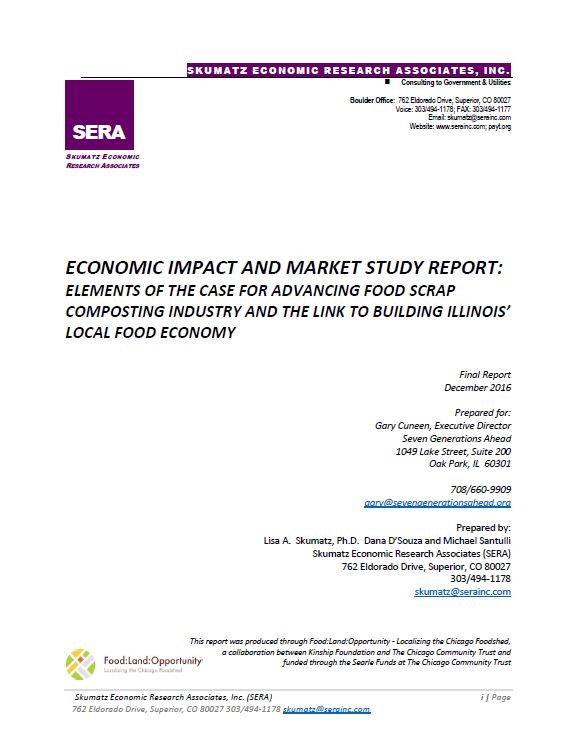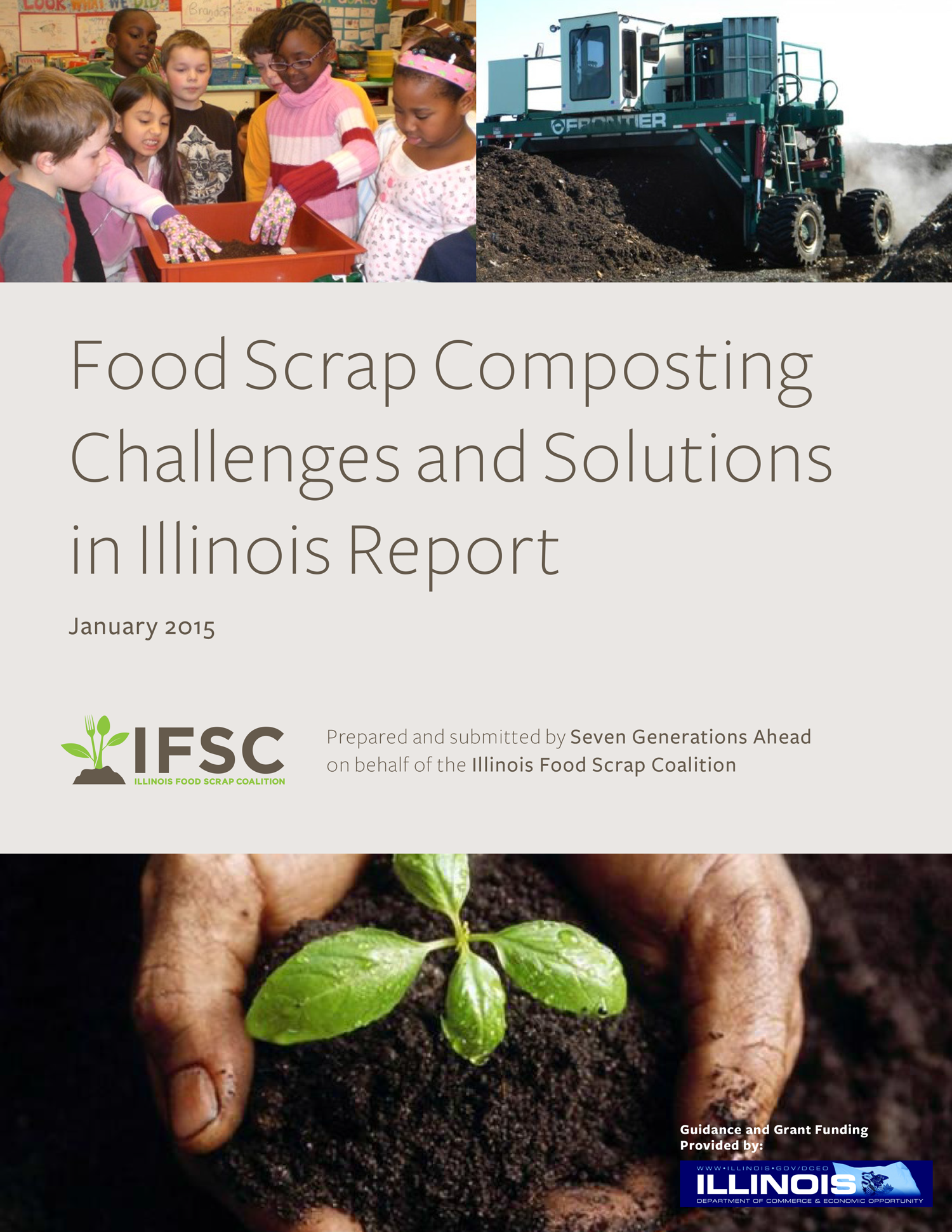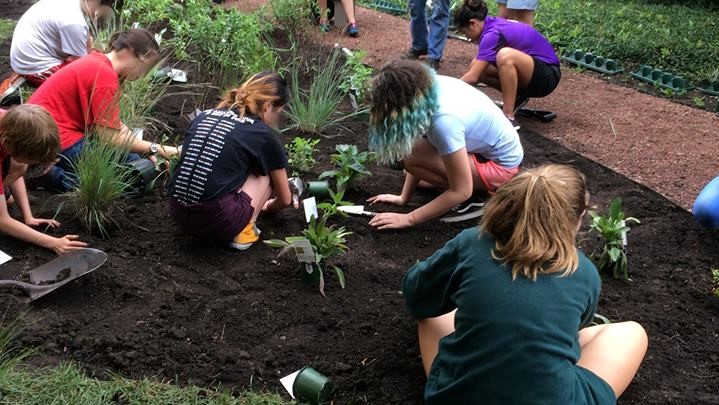Why Compost Food Scraps
Composting food scraps provides businesses, institutions, communities, and individuals with a method to dispose of a large portion of their waste streams in a way that benefits their bottom line and the environment. Public education and outreach are needed to help properly separate organics from trash to promote composting in a variety of settings. This education across sectors can lead to much needed environmental change. Composting provides an opportunity for everyone to take responsibility for the solid waste stream.
Read more about the benefits of food scrap composting for our Environment and Economy. Then dig into reports and research on food scrap composting in Illinois.
COMPOST BENEFITS THE ENVIRONMENT
The ability of compost to sequester carbon, rebuild depleted soil nutrients, conserve and retain water, limit erosion, reduce the use of negatively impactful synthetic chemical fertilizers, and reduce greenhouse gas emissions has strong environmental benefits.

Sequester carbon
The top 3.2 feet of the Earth’s soil stores more than three times the amount of carbon held in the atmosphere. Soil emits greenhouse gases to the atmosphere when soil quality and structure are negatively impacted by factors such as unsustainable land management practices, erosion and sedimentation. As debates continue over methods and policies to curb greenhouse gas emissions, there is widespread scientific agreement that amending soil with compost increases soil carbon sequestration, therefore reducing greenhouse gases in the atmosphere.
Improve soil structure and nutrient content
Compost makes soil more fertile for plant growth by controlling pH levels and increasing buffering capacity against pH change. Research shows that certain organisms found in compost protect against soil-borne diseases and plant pathogens.
Reduce soil erosion
Humus, a key material in compost, functions as the “glue” that binds soil together, making it more resistant to erosion. The more organic matter that is present, the more resistant to erosion the soil will be. The inverse is also true; soil with little to no organic matter cannot retain water, easily becomes compacted, and is highly susceptible to erosion.
In the US, 99 million acres of soil (28% of cropland) are eroding beyond soil tolerance rates, which means that we are losing topsoil at a faster rate than it is formed. Nationally, soil is being swept away 10 to 40 times faster than it is being replenished. About 60% of the soil that is washed away ends up in rivers, streams and lakes, contaminating waterways with fertilizers and pesticides.
Protect water quality
Compost reduces the need for synthetic fertilizers and helps filter out excess nutrients (phosphorus and nitrogen) that contribute to aquatic dead zones.
Compost supports low-maintenance landscapes while reducing or eliminating the need for synthetic chemicals that pollute water systems through runoff.
Water retention and flood mitigation
Compost helps soil retain moisture, reducing water runoff. The high organic matter content in compost (40-60%) increases water infiltration rates and the soil’s ability to retain water. Soil organisms create pore spaces for air and water, increasing permeability and storage capacity.
Compost increases water storage capacity by 16,000 gallons per acre-foot for each 1% of organic matter. This allows rainwater that would otherwise be lost to evaporation or runoff to remain within and replenish soil ecosystems.
Support local food production
Compost reduces fertilizer costs and increases crop yield. Amending soil with compost creates a controlled, slow release of phosphorus, potassium, sulfur and other micronutrients that are critical to plant growth and survival. These nutrients are less prone to being lost through leaching as the stable organic matter allows plants to take what they need when they need it.
Reduce greenhouse gas emissions
Composting food scraps reduces methane generated from rotting food in landfills. Landfills are the third-largest source of human-related methane in the country, accounting for 18% of methane emissions.
Compost supports greenhouse gas emissions reductions by:
- reducing the volume of biodegradable materials that end up in landfills and create methane;
- naturally sequestering carbon; and
- providing feedstock for biogas development.
Today, methane accounts for 10% of all greenhouse gas emissions in the U.S. The EPA’s Overview of GHGs (https://www.epa.gov/ghgemissions/overview-greenhouse-gases) reported that in 2017, methane accounted for about 10.2% of all U.S. greenhouse gas emissions from human activities.
PROJECT DRAWDOWN – Rather than generating methane, the composting process converts organic material into stable soil carbon, while retaining water and nutrients of the original waste matter. The result is carbon sequestration as well as production of a valuable fertilizer.
“The decisions we all make every day on the food we produce, purchase and consume are perhaps the single most important contributions an individual can make.”
– Chad Frishmann, Vice President and Research Director, Project Drawdown
COMPOST BENEFITS THE ECONOMY
Composting is developing as a viable, locally-based industry that achieves multiple objectives related to economic development, job creation and cost savings.


Local jobs
As the recent State of Composting in the U.S. report states, “Whether on a per-ton basis or a per-dollar-capital investment basis, composting sustains more jobs than other waste handling options such as landfilling and incineration.”
Illinois Environmental Council (IEC) reports, “According to a 2014 report by [Illinois Department of Economic Opportunity] DCEO, Illinois already has over 110,000 waste diversion jobs with a payroll of $3.6 billion.
Composting can create up to 4 times as many jobs as landfills.
Revenue and taxes
As of 2015, the compost sector added $35 million in value to the Illinois state economy: the 2015 level was only 15% of the estimated potential value of this industry. The majority of the value added would be received by the compost industry; however, the model results show that the ripple effects of such programs would reach a majority of active economic sectors in Illinois, thereby improving living conditions for people of all walks of life within the state.
In addition to general economic output, pursuing food scrap composting programs has significant impacts on local, state, and federal tax revenue. On the local and state level, total tax revenues can increase by a range of $3 million – $13.6 million, while on the federal level it can increase by a range of $16 million – $42 million.
Cost savings - waste disposal
United States: 22% of what is thrown away is food!
Illinois: 2.8 million tons of food are thrown away each year (approx 20%)
Diverting organic material from landfills extends landfill capacity, and reduces the need to build new landfills.
Statewide landfill life expectancy is 21 years at current disposal rates. Illinois regions range from a low of 11 years of remaining landfill life in Region 2, to a high of 50 years of landfill life in Region 7. Chicago and northeastern Illinois have the lowest life expectancy in the state at 11 years, and this region is also limited in capacity to increase the number of landfills because of population density, lack of available land, and competing developments in the area.
While Illinois’ landfill capacities are currently sufficient to meet waste disposal needs, there are areas across the state that will be faced with the prospect of paying to ship their waste greater distances or paying to build new landfills. And Illinois accepts MSW from out of state from as many as 9 states, and as far away as South Dakota located 800 miles away.
With high costs to purchase land, site and develop a landfill, and “not in my backyard” opposition, there is increasing pressure to compost food waste and all organic waste.
Cost savings - farmers
Illinois imports most of its synthetic chemical fertilizers, and is currently at a $598 million trade deficit in this sector. By improving soil quality, compost can effectively reduce or eliminate the need for these costly fertilizers. Compost creates an environment that stimulates the steady, controlled release of micronutrients necessary for plant growth, while at the same time limiting the loss of these substances via runoff.
Client testimonial for Midwest Companies OMRI certified compost: “The compost is a clean material that is consistent and easy to spread with my manure spreader. I feel it is a great input to use as part of my Nutrient Management Plan. It is the least expensive input available to me, and I have recommended Midwest Material Management’s compost to other farmers.” Matt Busse – Busse Farms, Waterman IL.
Businesses and institutions
Studies show that letting customers know that you donate and/or compost your food scraps can boost customer loyalty and employee morale.
“What we’re hearing from businesses that participate in food waste composting is they find it surprisingly easy to get their employees on board,” said Sarah Keirns, Green Business Program coordinator for Clark County Green Business in Washington. “For many employees, there’s a satisfaction that comes from doing the right thing for the environment.”
Composting programs support sustainability, waste reduction, and zero waste initiatives and can be the next sustainable step to manage unwanted organics generated at the workplace. Composting can be a positive addition to a business recycling and waste minimization program.
Many businesses benefit from composting, including office buildings, manufacturing facilities, hotels, event venues, hospitals, medical facilities, grocery stores, and restaurants. Reducing food waste through prevention and donation has significant environmental, social and economic benefits for businesses and employees.
It is important to educate employees on proper sorting procedures as they will be placing items in the correct containers for waste, recycling, and composting. This education can lead to change not only in the workplace but also at home and in the community.
“Climate change and resource utilization are closely linked, and food is one of the most important resources in that equation. This puts food waste squarely at the center of many global challenges. Reducing food waste would have a game-changing impact on natural resource depletion and degradation, food insecurity, national security, and climate change. As one of the largest economies and agricultural producers in the world, we believe the United States has a major role to play in setting an example and contributing to significant food waste reduction.”
– ReFED A Roadmap to Reduce U.S. Food Waste by 20 Percent
Share your food scrap composting resource with us
Members can advance food scrap composting and landfill diversion in Illinois by sharing their tools and resources. Help us help you share your publications that educate and spread access to food scrap recycling.
Share your work in food scrap composting by emailing PDFs and/or links to illinoiscomposts@gmail.com and filling out the form below.









